- Home
- C. R. Daems
The Black Guard: Book II: Evolution (Black Guard Series 2)
The Black Guard: Book II: Evolution (Black Guard Series 2) Read online
THE BLACK GUARD
Book II: Evolution
By
C. R. Daems
The Black Guard: Book II: Evolution
Copyright © 2015 by C. R. Daems
No part of this book may be reproduced or transmitted in any form or by any means, graphic, electronic, or mechanical, including photocopying, recording, taping, or by any information storage or retrieval system, without permission in writing from C. R. Daems.
This book is a work of fiction. Names, characters, places, and incidents are products of the author's imagination or are used fictitiously. Any resemblance to actual events or locales or persons, living or dead, is entirely coincidental.
ISBN-13: 978-0-9863514-2-6
ISBN-10: 0986351423
Check out all my novels at:
http://www.crdaems.com
and
http://www.talonnovels.com
CHAPTER ONE
Sassar Mountain: A new way of thinking
CHAPTER TWO
Outpost: Meeting of the Helix Systems
CHAPTER THREE
Blackwood: Change can be difficult
CHAPTER FOUR
Blackwood: Best laid plans
CHAPTER FIVE
Heibei: They aren't what they seem
CHAPTER SIX
Avivo: Learning a new way
CHAPTER SEVEN
Nizara: The Angels of Death.
CHAPTER EIGHT
Safort: a planet up for grabs
CHAPTER NINE
Safort: Representative Sharli
CHAPTER TEN
Draco: The War Games.
CHAPTER ELEVEN
Faithful: The enemy revisited
Novels by C.R. Daems
CHAPTER ONE
Sassar Mountain: A new way of thinking
As I strode toward the exercise yard where the new third-phase candidates were lined up, Captain Tyra Creech shouted, "Guard, attention." They bowed low, their eyes downward, making them vulnerable to attack, something no Guard would do except to show respect for a senior Guard officer. Creech nodded to me.
"At ease," I said, looking over the eight candidates who had successfully passed the second phase of Guard training and were now corporals competing for the rank of lieutenant. At most, half would qualify, and only one would go on to phase four with an opportunity to make captain. "The Guard is the elite of the Jax Military ... why?"
"Sir," a tall red-haired woman said and waited permission to continue. The Guard did not recognize gender while on duty; therefore, an officer was sir regardless of gender. I acknowledged her with a nod. "To qualify for the Guard, we had to exceed the requirements for the army and marines, making us the best of the candidates."
"What about the navy, Corporal Beals?" I asked, removing the satisfying look from her face.
"We were under eight years of age ..."
Under the Jax Inscription Law, children under eight years of age went directly into the army school while children eight or older went to the navy school.
"So we will never know if you would also have exceeded the navy requirements and are therefore the best of the best, will we?"
In the stunned silence, Captain Creech frowned.
I paced a few steps back and forth as I continued. "Exceeding the requirement for the army and marine schools is the entry requirements into the Guard school but not the reason we are considered the elite of the Jax Military. A very lofty position when you consider that the Jax Military is considered the elite of the mercenary groups in the known universe. The heads of government contract with the Jax Military because over the centuries we have earned their respect with our tradition—take no prisoners, the famous Jax saying which is taken to mean never surrender. They trust the Jax navy and marines to fight their space battles and the army to fight insurgents. But they trust only the Guard with their personal lives. We have demonstrated over the centuries that no one can provide the personal protection we can—not even the elite Jax army, navy, or marines."
"You mentioned tradition, but not duty," Corporal Franklin, a wiry looking man said, eager to be recognized, then quickly added, "Sir."
"Very good, Corporal Franklin. You've discovered the reason Captain Sapir is here: to explain tradition and duty to us," Creech said, and then looked at me and nodded.
"The Jax Military has long considered tradition and duty one and the same. If you followed tradition, take no prisoners, you had done your duty."
"Sir, isn't that still true?" Corporal Reyes, a stocky broad-shouldered man, asked while frowning. The expressions on the other seven faces said they had the same question.
"What is true today is the same as centuries past—if you die fighting, you will have lived up to the Jax tradition and done your duty. The universe will applaud your bravery, but our reputation is built on winning at any cost, not bravery. I doubt the universe feels we did our duty in those instances where our client died. They may concede we fought bravely and honorably, but not that we did our duty under the contract—to protect our client. I would add that in those cases those in charge also failed in their duty to protect those under their command." I paused to let each person consider my words and a totally new concept.
"But, sir, tradition requires we each be ready to sacrifice our lives to protect our clients, and that extends to those we command. I would think that is our highest priority," Reyes said, to nods of agreement from the rest of the group.
"The Guard is evolving, Corporal Reyes. Our previous standard assignments involved protecting a person or his family inside a permanent structure. However, the Guard has taken on several nonstandard assignments over the past few years. These assignments have earned us recognition as the Black Guard and will result in our being asked to take on more non-standard assignments."
A tall woman, named Corporal Crider I thought, asked, "Sir, haven't we always been referred to as the Black Guard?" Again, everyone looked to be agreeing but unwilling to comment.
Creech spoke before I could answer.
"Yes, Corporal Crider, but that referred to the color of our uniforms. The black now, however, refers to the cost of opposing the Guard—death. Captain Sapir has raised the Guard's already high standards even higher. As a consequence, we're anticipating being asked to take on more nonstandard assignments. But those assignments will involve more risk and correspondingly more Guards' deaths. Losses we cannot afford because of our high recruiting standards."
"As Captain Creech points out, the Guard is evolving. This evolution will require us to consider tradition and duty as separate entities—and duty as having the highest priority. And that is what we will be considering over the next two years. It's a practical and necessary consideration if the Guard is to survive the future," I said, hoping I had the skill to help these new leaders of the Guard see the difference between tradition and duty. The survival of the Black Guard might depend on it.
* * *
"Who would like to start?"
I had given the candidates a reading assignment from the Guard's historical records: the after-action report of Captain Darron Embry. Their task was to determine how it related to the separation of tradition and duty.
"Sir, since Captain Embry was captured, I can't see how it relates to tradition or duty. After all, he didn't have a choice. He was very brave surviving two days of being whipped by the rebels without giving them his team's positions. The report said his entire body had been skinned from the whip, in some places down to the bone. But in the end he was reported to have screamed he would tell them what they wanted to know. If he hadn't died shortly afterward, his e
ntire detail would have been destroyed." Corporal Franklin looked around the circle nervously. "Tradition and duty would dictate he die without aiding the rebels."
"And he wasn't too smart, getting caught by the rebels," Corporal Reyes said, with a smirk.
"Maybe it was intentional." Corporal Beals looked down at the table in thought. "Maybe getting caught was the idea. Get caught and then feed the rebels bad information on his detail's positions."
Corporal Varela shook his head. "But then why endure two days of torture. Sounds to me like he made a mistake, and he held out as long as he could before breaking."
"Would you believe a rebel you just captured who agreed to cooperate after an hour or so of torture?" Beals asked with a wry grin.
"Sure, most rebels would spill their guts ... All right, I see your point—it was a Jax Guard. But two days?" Varela shook his head.
"But if his detail knew that was what he intended, they would have written it up in their report," Corporal Crider put in. "No, he was captured against his will."
"What if his team didn't know what he planned, but realized it afterward? They didn't change their defensive positions so they ... trusted him with their lives," Corporal Barrow said. He grinned and nodded as if agreeing with some private conversation. "Tradition, die fighting or in this case while being tortured, and duty, save the client with the minimum loss of Guards' lives."
"Yes, that is my interpretation of the events," I said, acknowledging Corporal Barrow with a nod. "Knowing that the rebels' overwhelming force would eventually wipe out his detail and kill their client, Captain Embry decided their only chance was deception. But for some reason we may never know, he didn't have time to discuss it with his troops and had to act quickly. Possibly an opportunity suddenly presented itself, or he detected an imminent attack. Regardless, he maneuvered into a position to get captured, endured two days of brutal torture to ensure the rebels would believe him when he finally cracked, and gave them false positions that would give his detail the best advantage if acted on by the rebels."
I paused for everyone to think about the situation. Slowly, heads nodded as they considered the known facts. "Tradition would have been satisfied if they had just waited and fought to the death, but the inhabited worlds would have seen it as a failure of the Guard to protect a client—duty failed. Captain Embry satisfied tradition by sacrificing his life and duty to the client and his detail through the deception. Most think Guard officers wear the whip because of Captain Embry's bravery in surviving two days of torture. I wear the whip in honor of Captain Embry. A man whose sacrifice demonstrated he understood tradition and duty were not the same and in so doing saved the Guard from failing."
* * *
I entered the office of the Commander of the Guard, braced to attention, and bowed low with my gaze on the floor.
"At ease, Sapir," Wexler said from behind his simple wood desk. He was a tall thin man with silver-gray hair, which contrasted with his black uniform. His only decoration was three stars above a red dragon on his right sleeve. "Captain Creech has been quite impressed with your approach. He admits he was skeptical about the Jax Contract Committee's decision to have you design and teach a course to separate tradition and duty. Of course, the proof will be in the execution, which will take years to evaluate."
"That's true, sir. But I think the JCC was very insightful. Captain Creech selected the three individuals who demonstrated the best understanding of tradition and duty to be promoted to lieutenant and eligible for captain training. I think the selection would have been slightly different if he hadn't used those criteria."
"I agree. Creech and I discussed the candidates at great length." Wexler stopped to sip his cup of kaffa. "I found your interpretation of Captain Embry's actions very ... insightful. I believe your version fits his personality, his outstanding career, and the recorded facts. I've always disliked wearing the whip and considered it a nuisance, but now I will wear it proudly in honor of a courageous member of the Black Guard. I want you to write an official addendum to the Guard's history of the events on the planet Chaohu and Captain Embry's part in that action." He laughed. "I know Captain Attali has been teaching a few of the officers how to use that whip you both love after they heard how you used it at Lanzhou. I think the rest of the officers are going to want lessons after your addendum is published. That whip will no longer be a symbol of your rank but rather a symbol of Guard honor."
"Yes, sir. I'd like that. I believe he considered the Guard his family and sacrificed his life to protect it." I felt a strong empathy with the man, as though our minds were linked and I could hear his thoughts.
"How would you like to have an assignment?" Wexler asked, jarring me out of my musing about Embry.
"I had thought the JCC didn't want me on assignments so that the other dragons could take any nonstandard contracts and you could monitor the results." I was ecstatic and confused at the same time—ecstatic to have an assignment but confused as to why they had changed their minds.
"General Lerman plans to participate in a joint meeting of the leaders of the Helix Coalition on the planet Outpost and has asked for you to provide his security." Wexler smiled. "Maybe he doesn't want to trust this nonstandard assignment to one of the other captains, since it involves his life."
"How large a detail?" I asked, curious as to the threat the general anticipated.
"Just you, Sapir. I think the general is making a statement—the Jax Military has no equals ... and if you disagree, the single Black Guard accompanying me will be glad to discuss it with you." Wexler paused to take a drink of kaffa and smiled. "Good luck, Sapir. The Deathstalker will be in orbit tomorrow to pick you up."
CHAPTER TWO
Outpost: Meeting of the Helix Systems
Having been notified that the Deathstalker was in orbit and a shuttle had been dispatched, I made my way up the trail that led to the shuttle-landing pad at the top of Sasser Mountain. The chilly morning made the trek to the top invigorating. The sky was clear except for a few puffy clouds, allowing an unobstructed view of the terraces that formed the Guard's compound and the mountain range with its snow covered peaks, gushing waterfalls, and rivers of turbulent water racing to meet the distant valleys below.
As the small executive shuttle approached, I stood alone like a sentinel, dressed in the typical Black Guard uniform: black pants tucked into black-leather boots, black shirt with my rank on the right sleeve, a Jax laser strapped to my right thigh, an Mfw—multi-functional weapon—strapped to my left thigh, and an Mfi—multi-functional interface—strapped on my left arm. The dragon whip I wore around my waist like a belt and the red stars on my right sleeve identified me as an officer in the Guard. I felt like I stood on top of the world.
"Thank you, Hada," I said, looking up into the vastness of space, wishing she could hear me at her present assignment. She had dragged a dejected six-year-old Rivka Sapir into her dream of becoming a dragon in the Black Guard. Fourteen years later, it was no longer a beautiful dream but a beautiful reality.
The sound of the shuttle settling on the landing pad jerked me out of my musing. A marine lieutenant threw open the door of the shuttle and saluted as I strode up the steps.
"Captain Sapir, I'm Lieutenant Granger. If you are ready, General Lerman awaits you on the Deathstalker." He took my duffle bag and followed me into the shuttle.
I stopped to survey the inside. To my surprise, the shuttle was configured like an executive conference room with leather seats that swiveled, a couch, and seats with tables. And I appeared to be the only passenger.
"This is the general's private shuttle. I assume it's your first time aboard the Deathstalker," Granger said. "The Deathstalker is a scorpion class cruiser. They are classified as light cruisers; however, they have larger engines and more weapons than our standard cruisers."
I nodded and sat in the first single chair. He took the seat across the aisle from me. The lieutenant loaded a schematic of the Deathstalker onto my Mfi and spent most of
the two-hour trip explaining its layout and informed me the trip to Outpost would take two days.
When we exited the shuttle, Granger escorted me to the general's office, where two marine special security guards stood at attention outside the door. When they saw us coming, one of the guards knocked on the door, peeked in, and then stood back for me to enter. I walked in and bowed low while still keeping him in sight. Only for Wexler was I required to divert my eyes.
When I straightened back to attention, Lerman rose from behind his desk.
"Welcome aboard, Dragon Sapir," he said as he neared. "Please get something to drink and have a seat. We have much to discuss." He waved to the sideboard, which had a variety of drinks, and then to two armchairs, which sat facing each other with a small table between them.
As I poured a cup of hot tea, he continued, "We are going to a meeting with the leaders of the nine known inhabitable planets that constitute the Helix Coalition of Nations. The protocol for this meeting permits each representative to bring two cruisers into the system and a contingency of twenty to the planet for the meeting—advisers, security, and whatever. The coalition currently has no formal government; we form ad-hoc committees when necessary to address issues of mutual interest. But men tend to like having power and control, and that means formal navies, governments, and rules, so I expect that is the purpose of this meeting." He stopped and took a drink from his kaffa mug while scrutinizing me and waiting for a comment.
"You're anticipating alliances have been formed to coerce the other planets into forming a coalition government. So you've decided to make a statement. The Jax have no equal—not even against a piffling twenty-to-one odds."
Lerman laughed. "I thought you would understand. Unfortunately, my statement puts you more at risk than me. Killing me could create a civil war, whereas killing you wouldn't."
"That may be true, sir, but I would still like to proceed as if the threat will be against you. A civil war wouldn't benefit Jax financially." The general's scenario assumed the attack would appear to come against him but the real target would be me. And that also assumed people were logical, assassins could hit the target they were aiming at, and that they didn't have an entirely different agenda.

 The Phoenix Wars: Book I, Reprieve
The Phoenix Wars: Book I, Reprieve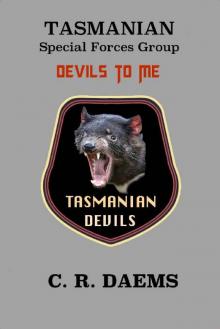 Tasmanian SFG, Book II: Devils to Me (Tasmanian series 2)
Tasmanian SFG, Book II: Devils to Me (Tasmanian series 2) The Red Admiral
The Red Admiral Tasmanian SFG: Welcome to Hell
Tasmanian SFG: Welcome to Hell Megan
Megan Desperate Measures: The Issog
Desperate Measures: The Issog Red Angel: Coup d'etat (Red Angel Series Book 5)
Red Angel: Coup d'etat (Red Angel Series Book 5) The Shadow Ryana (The Shadow Sisters Book 1)
The Shadow Ryana (The Shadow Sisters Book 1) Riss Series 5: The Riss Challenge
Riss Series 5: The Riss Challenge Red Angel: Book III: Hijackers
Red Angel: Book III: Hijackers The Riss Proposal: Book II in the Riss Series (Volume 2)
The Riss Proposal: Book II in the Riss Series (Volume 2) The Riss Enemies: Book VI (The Riss Series 6)
The Riss Enemies: Book VI (The Riss Series 6) Hijackers
Hijackers The Shadow Gypsy (The Shadow Sisters)
The Shadow Gypsy (The Shadow Sisters) The Seer Renee
The Seer Renee Kazak Guardians: Book III: Megan (Kazak Guardians Series 3)
Kazak Guardians: Book III: Megan (Kazak Guardians Series 3) Retribution Required
Retribution Required Riss Series 3: The Riss Survival
Riss Series 3: The Riss Survival The Riss Gamble
The Riss Gamble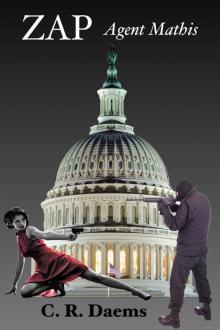 ZAP Agent Mathis
ZAP Agent Mathis The Black Guard: Book II: Evolution (Black Guard Series 2)
The Black Guard: Book II: Evolution (Black Guard Series 2) Zara the Wolf
Zara the Wolf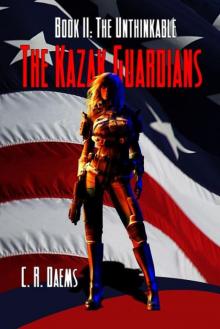 C.R. Daems - Kazak 2 - The Unthinkable
C.R. Daems - Kazak 2 - The Unthinkable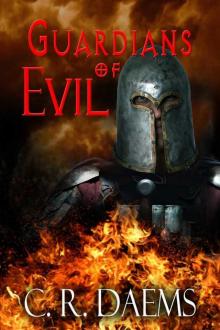 Guardians of Evil
Guardians of Evil Red Angel: Book II: Raiders (Red Angel Series 2)
Red Angel: Book II: Raiders (Red Angel Series 2) Talon of the Unnamed Goddess, a Fantasy Adventure
Talon of the Unnamed Goddess, a Fantasy Adventure Red Angel
Red Angel Women of Power
Women of Power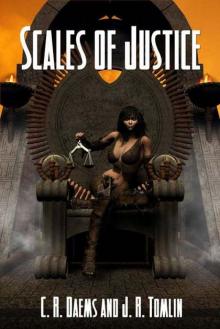 Scales Of Justice
Scales Of Justice The Black Guard
The Black Guard